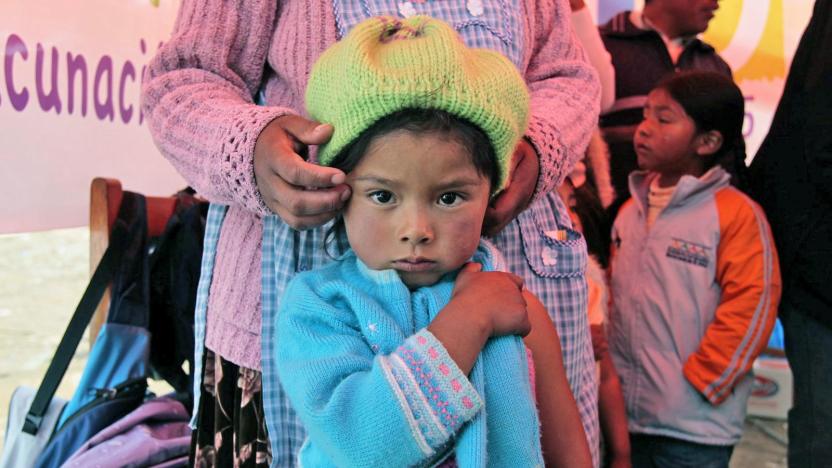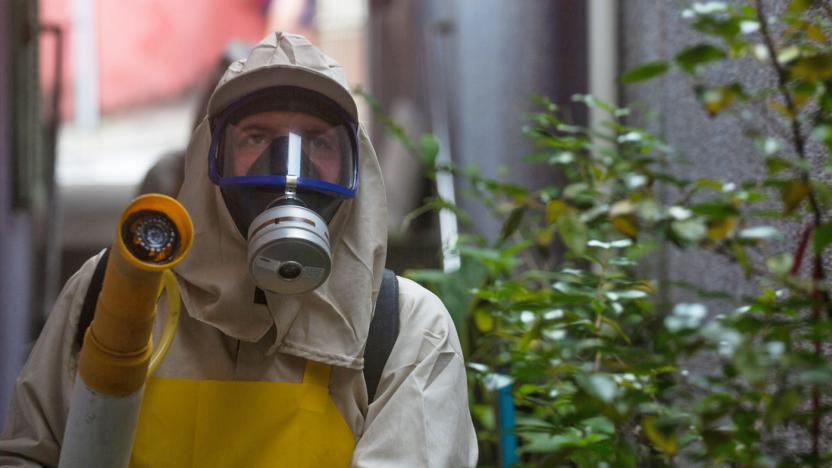WorldHealthOrganization
Latest

The WHO officially puts gaming on its list of addictions
The World Health Organization was putting its finishing touches on the eleventh edition of the International Classification of Diseases (ICD) when it released a draft back in December. The early version of the document, which medical professionals will use like its predecessors as a baseline for classifying and defining diseases, included a condition for the first time in the ICD's history: Video game addiction. Today, the WHO finalized ICD-11 and left the gaming disorder in, enshrining it in the medical reference standard.

New tech 'addictions' are mostly just old moral panic
The World Health Organization took an unprecedented step in January when it decided to include "gaming disorder" in its 11th International Classification of Diseases (IDC). Though doctors and researchers have examined the effects of heavy internet usage since the days when access arrived on AOL CDs, this marks the first time that the organization has listed this disorder as a mental health condition. Doing so could have far-reaching, and potentially negative, implications for how the disorder is diagnosed and treated.

The WHO may add video games to its list of recognized addictions
The World Health Organization's ICD, or International Classification of Diseases, is used by medical professionals, scientists, researchers and more to define and classify diseases around the world. It's currently in its 10th revision (ICD-10), but the 11th revision has been in the works for years. Now, a draft for the ICD-11 has been released online (the final version is due in 2018), and it recognizes video game addiction on its list of conditions.

WHO: Pollution is killing millions of children each year
The World Health Organization (WHO) released its first report on children's health and the environment, showing that the effects of pollution are felt most strongly by the very young. Of the deaths of children under five, a quarter are caused by smog, second-hand smoke, inadequate hygiene, unsafe water and other environmental risks. "[Young children's] developing organs and immune systems, and smaller bodies and airways, make them especially vulnerable to dirty air and water," said WHO Director-General Margaret Chan.

Measles has been eliminated in the Americas, according to WHO
It's been 53 years since the first measles vaccine was released in 1963, though most people alive today have gotten it bundled into the combined MMR prevention shot that first appeared in 1971. After a half-century of immunization, the World Health Organization (WHO) and Pan-American Health Organization (PAHO) has declared the entirety of the Americas — from the Aleutian Islands to Chile — to have eliminated measles.

Inhabitat's Week in Green: Solar Impulse's trans-Pacific flight, and more!
The Solar Impulse airplane is on a mission to circle the globe using only the power of the sun, and this week it continued its journey by crossing the Pacific Ocean. Meanwhile, Tesla showed just how fast the Model S is by challenging a Boeing 747 to a drag race. An Italian company is turning vintage moped parts into some of the coolest electric bikes we've ever seen, and a Swedish cyclist created an all-weather bike that looks just like a car. And we've seen buses and vans turned into some pretty incredible things -- but Lee Broom's palatial gallery on wheels takes the cake.

Zika virus declared an international health emergency
If it wasn't already patently clear that the Zika virus poses a serious threat, it is now. The World Health Organization has declared that Zika is a health emergency "of international concern," and that there needs to be "coordinated" response to both track and limit outbreaks. Effectively, it's a call to action -- countries and organizations are under pressure to devote research and funding toward fighting the mosquito-borne disease.

Cellphones are dangerous / not dangerous: little tykes under the spotlight
In the rough and tumble debate surrounding the mobile phone's ability to cause cancer, both sides agree that our young ones -- indeed, some of the heaviest users -- could be at an increased risk for cellular-induced tumors. According to a study published in the Journal of the National Cancer Institute, the radio emissions from mobile devices penetrate much deeper into the brains of children, and in the case of little tykes ages five to eight, their noggins will absorb twice the energy of the average adult. This, combined with their developing nervous systems, has brought concern for the welfare of our youngest mobile-savvy citizens, and led to a European study of nearly 1,000 (informed?) participants. Data was gathered over a four-year period, which relied upon self-reporting methods, where youngsters were found to not talk very often, and typically sent text messages instead -- big surprise, right? While long-term risks remain unknown, the researchers conclude that "a large and immediate risk of cellphones causing brain tumors in children can be excluded." In other words: little Suzy won't begin sprouting cancer cells overnight. While you doting parents may find comfort in the latest research, you might consider stopping short of giving the mischievous rascal an unlimited voice plan. After all, gossip still spreads best at the school yard. [Image courtesy Derek Olson (flickr)]

Cellphones are dangerous / not dangerous: Danish chatterbox edition
Concerned that a decade and a half of regular cellphone will have a long-term effect on your health? Hopefully the latest study conducted by members of the World Health Organization (WHO) will put your mind at ease. The examination followed nearly 3 million Danish adults, studying links between phone use and the formation of acoustic neuromas -- non-cancerous, slow-growing brain tumors that form on the main nerve that connects the inner ear to the brain. The study concluded that people who've used a handset for 11-15 years weren't any more likely to develop a tumor than those who don't use cellphones at all, though scientists are unsure that this is a long enough period of time to determine a significant correlation (or lack thereof). Still, this comes as refreshing news two months after the WHO released a study revealing that RF waves coming from phones are "potentially carcinogenic," due to a limited link to glioma and acoustic neuroma. Of course, none of these reports can actually conclude that cellphones cause cancer -- only that the two may be correlated. So, what does this latest study really do? It legitimizes the need to conduct more studies.

Research doubts link between cell phones, cancer
Back in May, the World Health Organization (WHO) issued the controversial results of a study that linked frequent cell phone usage to certain types of brain tumors. Now a scientific journal, Environmental Health Perspectives (EHP), has published an overview of similar studies that casts doubt on any links between cell phones and cancer. The journal notes that the WHO report was attempting to classify what kind of cancer risk might exist, not the actual probability of developing cancer. EHP had issues with the reliability of the WHO study, which asked 13,000 phone owners to remember cell phone usage from many years ago. The EHP authors mentioned that a number of other studies have not seen a link between cell phones and cancer. The importance of the EHP report lies in the fact that the journal has no connection at all with the cell phone industry, therefore reducing concerns of bias.

Cellphones are dangerous / not dangerous: cancer experts say 'What, me worry?'
If you haven't already gotten whiplash from the ongoing cellphone-cancer debate, a freshly released scientific review might just do the trick. In the paper, published Friday, a panel of experts from Britain, Sweden and the US conducted a thorough survey of previous studies, before concluding that existing literature is "increasingly against" the theory that cellphone use causes brain tumors in adults. The researchers also questioned the biological mechanisms underpinning this hypothesis, while acknowledging some lingering uncertainties, since data on childhood tumors and longer-term research are still lacking. The results come just a few weeks after the World Health Organization released its own literature review, in which it claimed that cell phones should be considered "potentially carcinogenic." But Anthony Swerdlow, a professor at Britain's Institute of Cancer Research and leader of the most recent investigation, said his group's work doesn't necessarily contradict the WHO, since the latter was simply seeking to evaluate cancer risks according to its own "pre-set classification system" -- under which things like pickled vegetables and coffee are also considered "potentially carcinogenic." Unfortunately, this doesn't mean that the debate will die down anytime soon, though Swerdlow expects more definitive conclusions within the next few years -- assuming, of course, that all of our brains haven't turned to oatmeal by then.

Cellphones are dangerous / not dangerous: the WHO changes its mind
To say that experts generally don't agree about whether cellphone radiation can fry your brain is an understatement of massive proportions, but amazingly enough, the World Health Organization has come to a pseudo-conclusion. A group of 31 scientists from 14 countries working in the org's International Agency for Research on Cancer says that -- based on a survey of the literature -- those electromagnetic fields are as likely to be potentially carcinogenic as 266 other worrisome substances, including DDT pesticide and the exhaust from your automobile. Mind you, the WHO isn't saying that cellphones cause cancer, as today's decision is merely the latest call for more research, but the fact that respected scientists even claim that a correlation should be considered will probably be enough to stir the pot.

E-cigarettes banned in WHO-ville
As it turns out, the World Health Organization (WHO) isn't condoning e-cigarette products -- shockingly -- as some manufacturers might like you to believe. In fact, the lawsuit flag is being waved at a few companies who brazenly plastered the organization's name and logo across promotional material, suggesting an endorsement of the product. The WHO's Douglas Bettcher asserts that the product is untested as a nicotine replacement therapy, stating, "If the marketers of the electronic cigarette want to help smokers quit, then they need to conduct clinical studies and toxicity analyses." So while e-cigs might not carry the same carcinogenic risks as traditional smoking, there are still plenty of health issues surrounding liquid nicotine and all the nasty additives it's served in... and the WHO isn't about to let you forget it.[Via PhysOrg]








